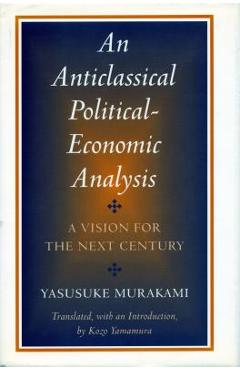Anticlassical Political-Economic Analysis: A Vision for the Next Century - Yasusuke Murakami

Detalii Anticlassical Political-Economic Analysis: A Vision
libris.ro
358.05 Lei
397.83 Lei
Political Science
Yasusuke Murakami
Anticlassical Political-Economic Analysis: A Vision - Disponibil la libris.ro
Pe YEO găsești Anticlassical Political-Economic Analysis: A Vision de la Yasusuke Murakami, în categoria Political Science.
Indiferent de nevoile tale, Anticlassical Political-Economic Analysis: A Vision for the Next Century - Yasusuke Murakami din categoria Political Science îți poate aduce un echilibru perfect între calitate și preț, cu avantaje practice și moderne.
Preț: 358.05 Lei
Caracteristicile produsului Anticlassical Political-Economic Analysis: A Vision
- Brand: Yasusuke Murakami
- Categoria: Political Science
- Magazin: libris.ro
- Ultima actualizare: 28-10-2025 01:22:05
Comandă Anticlassical Political-Economic Analysis: A Vision Online, Simplu și Rapid
Prin intermediul platformei YEO, poți comanda Anticlassical Political-Economic Analysis: A Vision de la libris.ro rapid și în siguranță. Bucură-te de o experiență de cumpărături online optimizată și descoperă cele mai bune oferte actualizate constant.
Descriere magazin:
In his final work, one that distills decades of research and thought, a distinguished economic thinker turned social scientist and philosopher confronts three crucial questions facing the world at the end of the century: How and in what form can a harmonious and stable post-cold war world order be created? How can the world maintain the economic performance necessary for the well-being of people while minimizing international economic conflicts and further deterioration of the world\'s environment? What must be done to safeguard the freedoms of all peoples? In attempting to answer these questions, Murakami criticizes classical political-economic analysis and offers his own anticlassical analyses and visions for the next century. By classical political-economic analysis, Murakami refers to analyses of power politics based on the nation-state system and to classical and neoclassical economic analysis which holds that unimpeded competition and free trade are fundamental bases for increasing wealth for the benefit of all. Murakami\'s anticlassical stance takes the form of a new, intellectually integrated and reasoned concept called polymorphic liberalism, which argues that traditional progressivism--the belief that humans have an ultimate unique path on which they will reach an ideal social and political-economic system--can no longer meet today\'s challenges. In his final work, Murakami confronts three crucial questions: How and in what form can a harmonious and stable post-cold-war world order be created? How can the world maintain the necessary economic performance while minimizing conflicts and environmental deterioration? What must be done to safeguard the freedoms of all peoples? In his final work, Murakami confronts three crucial questions: How and in what form can a harmonious and stable post-cold-war world order be created? How can the world maintain the necessary economic performance while minimizing conflicts and environmental deterioration? What must be done to safeguard the freedoms of all peoples? In his final work, Murakami confronts three crucial questions: How and in what form can a harmonious and stable post-cold-war world order be created? How can the world maintain the necessary economic performance while minimizing conflicts and environmental deterioration? What must be done to safeguard the freedoms of all peoples? In his final work, one that distills decades of research and thought, a distinguished economic thinker tur

Produse asemănătoare
Produse marca Yasusuke Murakami

Anticlassical Political-Economic Analysis: A Vision for the Next Century - Yasusuke Murakami
![]() libris.ro
libris.ro
Actualizat in 28/10/2025
358.05 Lei